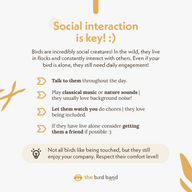How to Keep Your Bird Stimulated
- Ada Rocher

- Apr 2, 2025
- 4 min read
Updated: Apr 13, 2025
Does your bird seem bored? Maybe they scream too much, pluck their feathers, or just sit there looking uninterested in everything? The good news is, there’s a way to fix that!
Birds are highly intelligent and social creatures that need daily mental and physical stimulation to stay happy. In the wild, they spend their time flying, foraging, socializing, and exploring. When kept as pets, their environment is much more limited, so it's up to us to make sure they get enough stimulation to prevent boredom and behavioral problems.
What is Considered Stimulation?
Stimulation isn’t just about having toys. It includes anything that engages your bird physically, mentally, or socially. Even small changes can add variety to their day and keep them interested in their environment.
Physical stimulation: Activities that encourage movement, such as flying, climbing, playing, or chewing.
Mental stimulation: Engaging your bird’s brain through foraging activities, training, puzzle toys, or introducing new challenges.
Social stimulation: Talking, singing, spending time together, or allowing interactions with other birds.
Environmental changes: Moving perches, rearranging the cage layout, or even changing the location of their food bowl can provide activity and prevent boredom.
Even the smallest change can make a difference in their daily life!
Small Changes
Rotate Their Toys Frequently

Imagine playing with the same toy every single day—it would get boring fast! Birds feel the same way. If they lose interest in their toys, they might start looking for stimulation in unhealthy ways, like screaming or feather plucking.
Swap out toys regularly – Instead of giving all toys at once, rotate them every few days or weeks.
Introduce variety – Use different materials and textures, such as wood, cardboard, palm leaves, pine cones, and cork.
DIY toys – If you don’t want to buy new toys all the time, make your own using safe materials like paper rolls, cork, or sola wood.
Keep a small stash – Store some toys away and bring them back later. This makes old toys feel “new” again!
Mental Challenges
Encourage Natural Foraging

In the wild, birds spend from six to eight hours searching for food. If their food is always in a bowl, they miss out on a big part of their natural behavior.
Start simple – Hide treats inside paper rolls or crumpled paper so they have to work a little to get their reward.
Create a foraging box – Fill a small box with shredded paper, safe leaves, or hay and hide treats inside.
Use natural materials – Leaves, flowers, coconut husk, and pinecones can all be great foraging tools.
Try puzzle feeders – These require birds to move pieces around to access their food, making mealtime a fun challenge!
Help them learn – If your bird is new to foraging, show them where the treat is at first so they understand the game.
Physical Activity
Teach Them New Tricks

Did you know birds love learning? Teaching them tricks is not just for fun—it helps them stay engaged, build trust, and strengthen your bond.
Start with simple tricks – The step-up command is a great way to build trust and confidence.
Use positive reinforcement – Reward your bird with a small treat or verbal praise like “Good job!”
Try target training – Using a clicker and a target stick can make learning new behaviors easier.
Make training short and fun – Keep sessions under 10 minutes and always end on a positive note!
Allow Safe Exploration
Birds aren’t meant to stay in cages all day. Letting them explore safely keeps them curious and active.
Create a bird-safe area – Remove toxic plants, open windows, and any dangerous objects they could chew on.
Use play stands – Give them an interesting place to climb, chew, and play.
Encourage supervised window time – Birds love watching the outside world, which can be an enriching experience (ONLY IF THEY ARE USED TO A WINDOW, OTHERWISE THEY COULD FLY TO IT).
Help them feel safe – If your bird is hesitant to explore new spaces, place treats around the area to encourage them to move.
Social Interaction
Social Interaction is Key!

Birds are incredibly social creatures. Even if they live alone, they still need daily interaction to stay emotionally healthy.
Talk to your bird – Simply chatting with them throughout the day makes them feel included.
Play soft music or nature sounds – This can provide comfort, especially when you’re not around.
Let them observe your activities – Many birds enjoy watching you clean or work because it makes them feel part of your flock.
Respect their boundaries – Not all birds like being touched, and that’s okay! Just being near them is enough to build trust.
Final Reminder
To keep your bird happy and stimulated, remember to:
Rotate their toys frequently to prevent boredom.
Encourage foraging by making them work for their food.
Teach new tricks to keep their brains active.
Allow safe exploration outside their cage.
Provide daily social interaction, whether through talking, playing, or spending time together.
A busy bird is a happy bird!
By making small but meaningful changes to their routine, you can ensure they live a fulfilling and enriched life.





















Comments